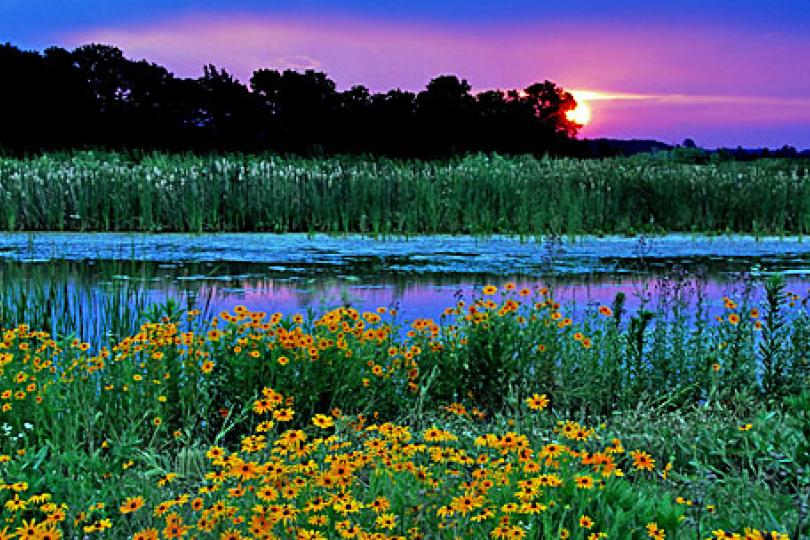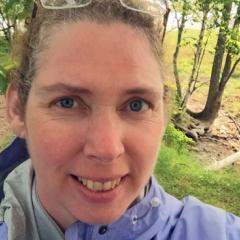Take Away Thoughts from the National Adaptation Forum
Editor's Note: This post originally appeared the Association of State Wetland Managers' blog, The Compleat Wetlander.
Thanks to the support of the Association of State Wetland Managers (ASWM) and the Switzer Foundation, I was able to attend the National Adaptation Forum in St. Louis, Missouri, this week. This was a chance to meet with invested people who are working on the same environmental, social and economic issues that I am and led to a wonderful cascade of linkages and opportunities. My shockingly heavy carry-on suitcase (just ask the airline worker who took it from me for planeside check) returned home full of useful just-released reports from leading researchers and organizations and laden with potential.
I am most appreciative of EcoAdapt, who coordinated the Forum, for giving all of us the opportunity to learn from each other and compare ideas, as well as inspire each other. Hundreds of organizations, scholars and agencies are working tirelessly to develop assessment tools, techniques and targeted solutions to address climate change. However, proliferation presents a challenge as well. Based on the comments from participants across all the sessions I attended, information overload has begun to kick in. There are now so many tools and practices that navigating through them and selecting the right one for a region, sector, issue, outcome…has become a challenge itself.
A huge opportunity area for growth and refinement will be the testing and evaluation of many of these tools. Some are too new to have gone through rigorous review; others don’t have funding to complete the task. Whatever the reason, funding and good evaluation processes need to be applied to understand what works, how, to what end under what specific circumstances. Additionally comparative analysis between tools, identifying in what contexts and for which purposes each tool is best suited is needed. It is great to find that there are people working on task. I refer to them as the Meta People – organizations like EcoAdapt, Climate Adaptation Knowledge Exchange (CAKE), The Nature Conservancy (TNC) and others that are reviewing, compiling and finding ways to provide user-friendly comparisons to help decision-makers navigate through their options.
Working with staff from EcoAdapt and the Point Blue Conservation Science nonprofit, I co-led a working group at the Forum to gather information about wetland work related to stormwater management and restoration/mitigation. What came out of this session was a clear need to identify case studies where this work is happening successfully and to describe the tools that do exist, including the context within which they work. In most working groups I attended, there was a call for well documented case studies, rather than informal references without context or evaluation.
Also evident is the critical role of political will and regulatory power. If the governor, mayor or a community leader with a solid base of support and social capital stands staunchly behind the adaption initiative, presentations indicate that the sailing was often smooth. And the opposite occurred in areas where there was political resistance. In the same way, where a state or municipality had adopted regulations to require certain action (i.e. if there was regulatory impetus), this removed a number of initial hurdles to moving forward with adaptation work. Although this is intuitive, many planning processes bypass or only pay lip service to these considerations. The best laid of plans likely won’t work without a supportive context.
However, if there is not political will at one level (e.g. state level, county level), it does not necessarily mean that there isn’t activity at another level. Dr. Derek Kauneckis’ Ohio University study provides evidence that those states not working on climate change at the state-level did have work happening at the municipal level. Understanding where the political will is – at what scale, in which agencies, and through which individuals should all be taken into consideration.
As part of this scale issue, in many cases presenters and participants argued that large scale climate change data does not make the case for local or regional decision makers, where specific decisions about adaption work often needs to take place. The cost of data downscaling is significant. Along with this is the need for ecosystem service valuation work, but again, resources play a huge role in the availability of this information. Repeatedly practitioners shared that they wished there were more resource-efficient, rapid assessments for this kind of work. A few states and organizations offered potential examples, which we will be looking into shortly.
At the Forum there was lively discussion about the risk of maladaptation — adaptation that worked in one area, but had unintended consequences in another or functioned in a way that was unexpected due to some oversight. We at ASWM have just been learning about the challenge of siting solar development projects and their potential negative impacts on wetlands through practices used to install and maintain projects. Yes, solar is good, but best management practices are needed to avoid damages to wetlands. Efforts across the US to encourage solar projects in underserved communities illustrates the need to get ahead of the curve and help states and tribes develop strategies to ensure wetlands protection at the same time solar solutions improve energy equity.
A final point I wanted to bring home is the important role of cultural values in all of this work. What goes into models, what is prioritized for adaptation work, for protection, for action is all tied both directly and discretely to the values of the people undertaking the adaptation decision-making. Understanding how people prioritize and the role of values in this work should not be overlooked. Several social scientists and research organizations who presented at the Forum are looking at this work. ASWM, states, tribes and others would benefit from taking a closer look at this work as we work to integrate climate adaptation into our wetland work. In this same vein, ASWM will have an intern this summer who will be working to develop a comparative matrix of ecosystem valuation tools to help state identify tools that best fit their capacity.
At ASWM, we hope to incorporate and share many of these ideas with you over the coming months and years. Our resource pages on climate adaptation at aswm.org will be updated to include a range of new reports, tools and other resources I have brought home from the Forum in the near future.
For more information about the National Adaptation Forum, go here.
To view ASWM’s Climate Adaptation Webpage (which is in the process of being updated), go here.

